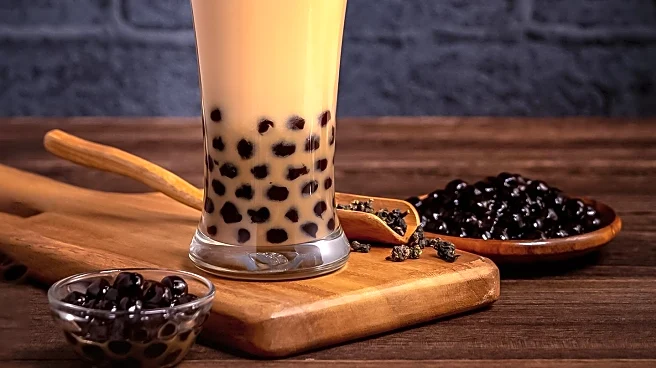What's Happening?
Consumer Reports has conducted safety tests on bubble tea, a popular drink known for its chewy tapioca pearls, and found that all tested samples contained lead. The tests included pearls from major chains such as Gong Cha and Kung Fu Tea, as well as packaged boba from Trader Joe’s and Wu Fu Yuan. Although the detected lead levels were not high enough to warrant a complete avoidance of bubble tea, the presence of lead in all samples suggests that it should be consumed only occasionally. Health experts emphasize that no amount of lead is safe, with children and pregnant individuals being particularly vulnerable to its effects. Trader Joe’s has responded by discontinuing its Instant Boba Kit, while Wu Fu Yuan has committed to enhancing its quality control measures. Gong Fu Tea and Gong Cha have not commented on the findings.
Why It's Important?
The discovery of lead in bubble tea highlights a significant public health concern, particularly for frequent consumers of the drink. Lead exposure is known to have detrimental effects on health, especially in children and pregnant women, potentially leading to developmental issues and other health problems. This revelation may prompt consumers to reconsider their consumption habits and could lead to increased scrutiny and regulation of food products that are prone to contamination by heavy metals. The findings also underscore the importance of food safety and quality control in the food and beverage industry, potentially influencing industry standards and practices.
What's Next?
In response to these findings, there may be increased pressure on bubble tea manufacturers to improve their quality control processes to ensure consumer safety. Regulatory bodies might also consider implementing stricter guidelines and testing requirements for products that are susceptible to heavy metal contamination. Consumers are likely to become more cautious about their bubble tea consumption, potentially affecting the market demand for these products. Additionally, there could be a broader push for transparency in food labeling, allowing consumers to make more informed choices about their dietary habits.
Beyond the Headlines
The issue of lead contamination in bubble tea raises broader questions about the safety of imported food products and the global supply chain. It highlights the challenges of ensuring food safety in a globalized market where ingredients are sourced from various regions with differing environmental and regulatory standards. This situation may lead to increased advocacy for international cooperation in setting and enforcing food safety standards. Furthermore, it could spark a conversation about the environmental factors contributing to heavy metal contamination in agricultural products, such as soil pollution and industrial emissions.









